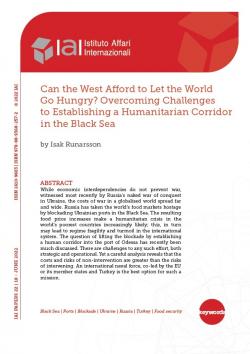Can the West Afford to Let the World Go Hungry? Overcoming Challenges to Establishing a Humanitarian Corridor in the Black Sea
While economic interdependencies do not prevent war, witnessed most recently by Russia’s naked war of conquest in Ukraine, the costs of war in a globalised world spread far and wide. Russia has taken the world’s food markets hostage by blockading Ukrainian ports in the Black Sea. The resulting food price increases make a humanitarian crisis in the world’s poorest countries increasingly likely; this, in turn may lead to regime fragility and turmoil in the international system. The question of lifting the blockade by establishing a human corridor into the port of Odessa has recently been much discussed. There are challenges to any such effort, both strategic and operational. Yet a careful analysis reveals that the costs and risks of non-intervention are greater than the risks of intervening. An international naval force, co-led by the EU or its member states and Turkey is the best option for such a mission.
-
Details
Rome, IAI, June 2022, 17 p. -
In:
-
Issue
22|18 -
ISBN/ISSN/DOI:
978-88-9368-257-2
1. The case for humanitarian intervention
1.1 A global food crisis could be disastrous for the global order
2. Three diplomatic and strategic challenges to a humanitarian corridor
2.1 Ukraine
2.2 Russia
2.3 Turkey
3. Four operational challenges
3.1 Clearing sea mines will require considerable resources and time
3.2 Odessa’s port loading capacity needs to be restored
3.3 A tight shipping industry and long shipping times might slow down transportation
3.4 Solving the question of insurance might require public sector intervention
4. To intervene or not to intervene? That is the question
References



